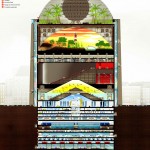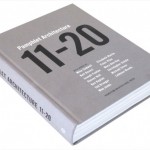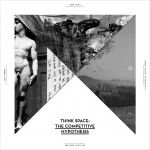Salaryman #6, a short 2002 movie, is a tale of modern life in Japan. A man is seen sprawled on the floor in an office; his colleagues help him to his feet but he seems to have lost his memory. Back home, he modifies a camera to take photographs automatically and he adjusts it to his shirt. Spectacular widescrean footage of a mundane day-to-day life: apartment block, train, work, convenience store and dinner at home again. The pieces of a repetitive life are thus revealed.
“I believe that precisely the evolution of contemporary capitalism and the instances of modern society make Marx’s program so actual. A program that has been thoroughly reclaimed by Amadeo Bordiga in the 50’s through a strongly anti-productive view: Bordiga says “As long as the purpose of the production will be to increase the rates of production, to increase the mass of products, to increase the mass consumption, in any way, whatever the sign and the mask under which this is presented, we can say we move towards socialism”. Socialism is characterized first of all by a clear signal, namely, that increased labor productivity may serve to reduce the stress of work by producers and free hours of life, which are, according to Bordiga, the only substantial form of freedom”.
Liliana Grilli, from her lecture “Bordiga and the relevance of Marx” (“Bordiga e l’attualità di Marx“, watch it on YouTube). Translation by Socks. Original text in Italian below.
Related: N+1







“Io credo che proprio l’evoluzione del capitalismo contemporaneo e le istanze che si fanno sentire all’interno della società oggi, rendano attuale questo programma di Marx, un programma che era stato recuperato integralmente negli anni 50 da Bordiga in una visione fortemente antiproduttiva: Bordiga dice “Fino a quando la finalità della produzione sarà quella di accrescere i ritmi produttivi, di aumentare la massa di prodotti, di aumentare la massa dei consumi, in nessun modo, qualsiasi sia il segno e la maschera sotto cui ci si presenta, possiamo dire di andare verso il socialismo”. Il socialismo sarà caratterizzato innanzi tutto da un segnale preciso, cioè che l’aumentata produttività del lavoro possa servire per ridurre lo sforzo di lavoro dei produttori e liberare ore di vita, che sono, secondo Bordiga, l’unica sostanziale forma di libertà”





Leave a Reply